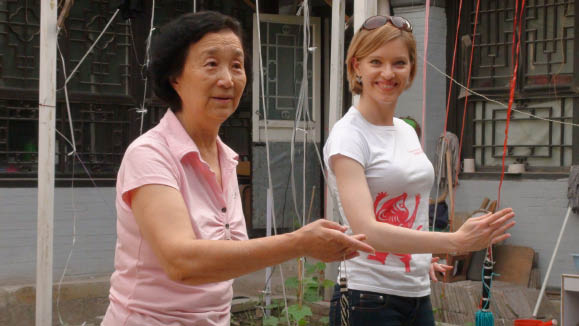|
Journey to the East -- Elyse Ribbon's Decade in Beijing
By staff reporter VAUGHAN WINTERBOTTOM
YOU can use chopsticks; at least you won't starve to death" – is perhaps not the passionate argument in favor of studying abroad in China. But this facetious remark, made to Elyse Ribbons by a friend as she was tackling a pot of instant noodles in a dorm room at the University of North Carolina, Chapel Hill, was the beginning of a decade-and-counting China adventure for the Detroit native.
In 2001, Elyse, an Arabic major, had made all the arrangements to study abroad in Cairo. When the program was cancelled at the last minute, she was left plan-less in the U.S. with no student housing and no chance of enrolling on time for the new American semester.
"My friend – the chopstick joker – was a Mandarin major, and convinced me to go with him to China for a semester of anthropology under the Burch Fellows program. At the time, I think I could muster up three pieces of knowledge about China – the Great Wall, bound feet and Mao Zedong."
Now, having spent close to 10 years in Beijing, saying she knows a bit more about the country is a wild understatement.
 |
|
Elyse takes a performance class in a hutong courtyard. |
I met Elyse at the second round of the recent Mandarin Star competition for foreign students in Beijing. She was the first contestant up for the afternoon session of the second round, which saw 60 students make Chinese-language video introductions to their campuses and present them to each other at the competition. Assessment was based on how well a student answered questions about another student's video, which he or she watched, together with judges and the audience, on stage. Donning a flowing gown redolent of the American flag, Elyse wowed with her mellifluous command of Chinese, and won a place through to the final. She was eventually selected as one of the competition's winning Mandarin Stars.
But the celestial sobriquet doesn't do justice to Elyse, who is somewhat of a modern-day renaissance woman. Now in her 10th year in Beijing, she boasts an eclectic array of occupations, including radio host, theater producer and playwright, actress, singer, professional MC, model, translator, journalist, author and businesswoman.
At the Mandarin Star competition, she represented the National Academy of Chinese Theater Arts, where she is currently one of only two foreigners studying for a Master of Arts in Peking Opera. The video she produced for the competition shows her in a Peking Opera workshop training in this infamously rigorous discipline, serious practitioners of which usually train from age 4-5. She's been learning for two years, and obviously has a talent for it.
"When I decided to come to China, I thought it would be an interesting six months and that would be that. I never imagined I'd be in the country for a decade and build a life in Beijing," says Elyse.
"I fell in love with the capital when I arrived in 2001, and on heading back to finish my studies in the U.S. I changed my major to Asian Studies with Chinese." After graduating in 2003, she went straight back to China: "It was quite easy to find a good job teaching English at the time – a lot of foreigners had fled the specter of SARS in the country."
After a short stint in pedagogy, which seems like the prerequisite profession for most foreigners who craft long-term careers in China, Elyse took up a job at the U.S. Embassy in Beijing. "I had a passion for intercultural communication – I still do – and thought I wanted to work in the State Department. It took me four years there to realize government work wasn't for me," she confesses.
In 2006, while still working at the embassy, she wrote her first play. Titled I Heart Beijing, Elyse produced the play herself and it ran at the HART Centre for the Arts in Beijing's avant-garde 798 art district. Presenting a poignant and hilarious take on the intertwining of Chinese and foreign lives in Beijing and the fun and fireworks that ensue, I Heart Beijing was a big hit.
Thanks to that success, Elyse quit her job at the embassy and established her own theater company, Cheeky Monkey Theater. She has gone on to write and produce a series of well-received productions through Cheeky Monkey, a name she chose because she says it translates well into Chinese – and because she's primatal by Chinese zodiac. Some of the company's notable plays, which she usually writes in a combination of English, Chinese and "Chinglish," include Kung Pao Shakespeare, Green Eyes on Chinese, Lethal English and Iron Brothers.
| 